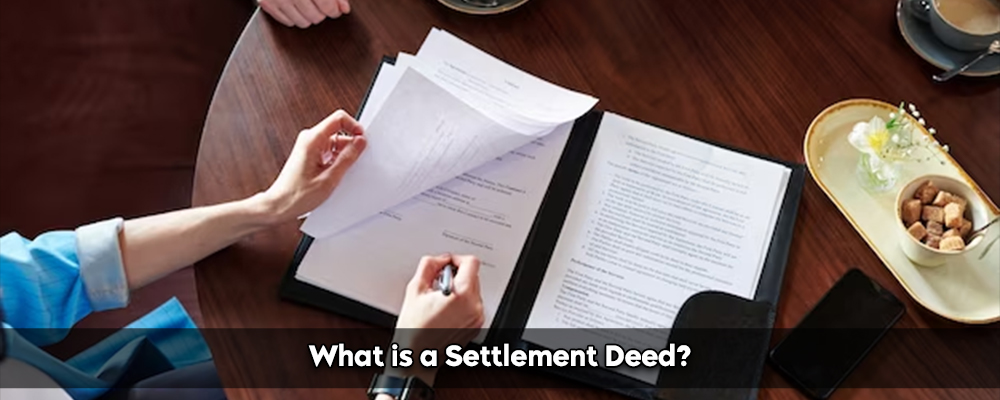The definition of a settlement deed changes to become a legal tool used by parties to resolve disputes when it comes to real estate, which includes land or buildings. The legal principle states that the settlement is the landlord’s discretionary disposal of real estate, whether it be mobile or inanimate. For a settlement deed to be enforceable, it needs to be documented and signed. Settlement deeds are frequently used to resolve legal disputes involving property division, court cases, and payment settlements.
Settlement Deed: About
A legal document that describes an agreement between opposing parties to resolve a dispute is called a Deed of Settlement, sometimes referred to as a Deed of Settlement. A deed of settlement, which has legally enforceable provisions agreed upon by the parties, is a common substitute for litigation. These agreements typically forbid the parties from starting further legal proceedings because the settlement is regarded as final.
Settlement Deed: Provision
- A settlement deed will specify the creation date of the deed.
- A list of those involved in the disagreement and its resolution
- “Recitals” which include background information about the disagreement, the parties’ connection, and specifics concerning the issue, will be included in a deed of settlement.
- The “Operative Part” is the next crucial element of a deed of settlement. The following details are included in a deed of settlement’s operational part:
- In this portion of the operating part, it will be explained who is in charge of making payments and what happens when it is accepted. Additionally, this section will include a deadline for the payment.
- The territorial laws or state laws that apply to the deed
- Taxes
- Maintaining confidentiality
- Key phrases that are commonly mentioned in the text will be defined in the deed of settlement.
- A page of execution bearing the signatures and names of the witnesses, as well as the names and signatures of every party to the settlement deed.
Settlement Deed or a Will: What to Choose?
A settlement deed or a will, depending on your goals and circumstances, is the better option.
- A settlement deed can be the best choice for you if you want to transfer property while you are still living and prevent future disagreements.
- A will is necessary, though, if you want to make sure that your possessions are distributed in accordance with your preferences when you pass away.
- To fully comprehend the legal requirements and implications of wills and settlement documents, it is advised to speak with an attorney. They can offer you the best advice based on your particular requirements and assist you in coming to a well-informed conclusion.
Settlement Deed: Benefits
- A deed of settlement’s execution can be a very successful means of settling and concluding a legal issue. In contrast to court proceedings, a “win-win” resolution can be reached when the interests of both parties are satisfied. being attributed to the earlier discussions that took place
- Parties can save the stress and expenses of litigation since the settlement enables them to avoid going to court.
- Due to the confidentiality clauses found in most Deeds of Settlement, parties are able to resolve their disagreement without drawing attention to themselves and to keep their agreement and legal matters private.
- Parties to a Deed of Settlement are allowed to agree to a settlement that best suits their needs, making them an extremely flexible means of settling disputes. Their unique demands and interests can be satisfied. This typically even entails mutual satisfaction and a resolution that forgoes any admission of responsibility.
Settlement Deed: Limitations
- A deed can only bind the parties to it. No other parties may be bound by it.
- A contract between two parties cannot stop statutory agencies from carrying out their duties.
- If a deed of settlement violates the law, or public policy, or is intended to conceal illegal action, it has no legal significance.
Outside of court, discussions between two parties frequently result in the creation of a Deed of Settlement. Parties in dispute might save time and money by avoiding litigation thanks to a deed of settlement, among other advantages.
In the event that a Deed of Settlement cannot be formed and you are in disagreement with the opposing party, you may choose to settle your legal issues through arbitration or mediation, two more alternative dispute resolution procedures. You should get legal counsel from a lawyer if you need help drafting a deed of settlement or if you’d like more information about alternative dispute resolution procedures.
One can talk to lawyers from Lead India for any kind of legal support. In India, free legal advice online can be obtained at Lead India. Along with receiving free legal advice online, one can also ask questions to the experts online free through Lead India.




